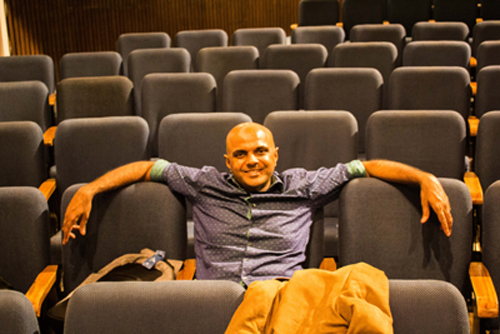Spotlight on breaking uneasy silence over mental illness

On familiar ground: Jehan Aloysius captured at the theatre
Trapped in a mausoleum of a house, Joyce is a schizophrenic. Victim to hallucinations, she is covered in a blanket of paranoia which makes her suspect her husband, Rajeev, of infidelity and even being responsible for the death of their daughter Nicky. Her one ally is art, which she uses to give wings to her stifled voice, and to ‘accuse, torment, test and tease’ all those who oppress her.
Thus begins the dark play called Mind Games, a psychological thriller that breaks the uneasy silence over mental illness. It is a tale “of a family with secrets” and forcefully silenced voices, says Jehan Aloysius, that uncannily versatile playwright, who this time unpacks something close to his heart.
The setting is a grand but desolate Sri Lankan house a few decades back. It has a touch of the Victorian Gothic novel’s mansion where the sensitive yet strong women characters feel fettered in a world that is patriarchal- denied the right to live unbridled, following their hearts and dreams. But Joyce is never really the Victorian ‘mad woman in the attic’- given that she uses her art and other strategies to break away from the patriarchal forces and attitudes to find her voice, and let it be heard and believed.
Nonetheless being a strong, creative or artistic woman who is restricted “creates a kind of pressure cooker for emotions and conflict to well up” explains Jehan, and at the heart of this story is that very conflict, together with dark secrets within the family which “turn malignant, and poison relationships; grow like a cancer and consume people.”
Jehan is rather proud of his new play, because it is universal (precisely because it is abidingly personal). Mental sickness is far more common than most of us think, says Jehan, hence the need to bring it under the stage lighting.
“I’ve found that writing plays is therapeutic indeed. I’ve also realized the power of theatre as a tool that can offer healing for audiences and performers, as well as for the writers and creators of shows. I firmly believe it’s important to break the silence and stigma of mental health issues. So, I sincerely hope Mind Games can stimulate more open discussion on the subject.”
He adds that the protagonist, Joyce, is “based on two very real people in my life who are in a constant battle with this condition.”
The script at first was short and one-act, but over the years it was revised, and from 2018 was thoroughly refined and rewritten with stringent readings from people who were familiar with the issues discussed.
The issues included not only mental maladies but also domestic violence- “physical, mental and sexual”.
Joyce is probably the most feminist of Jehan’s characters up to now- though he has created many of them, all ready to “subvert patriarchal authority within the domestic space, and do so in radical ways”.
Joyce is “in a constant battle with the patriarchal forces that attempt to dominate her and demonize her voice. She feels that she is victimized and demonized due to her gender, creativity and schizophrenia. She is an outspoken feminist, and seems to align herself with other creative women such as Virginia Woolf and Sylvia Plath and to some degree Germaine Greer as well.”
The Gratiaen judges commended the play for its ‘poignant character development’ and Jehan is gratified. Creating Joyce was a major challenge, he admits, given her complex mind and that her perception for a part of the play is not normal.
The narrative being exclusively through dialogue, “speech and conversation alone need to capture the nuances, poetry, subtext, context, social status, personality and emotion.”
Language too has to show social divisions and different personalities.
“As someone who studied psycho-linguistics with a focus on the Lankan context, I attempted to give each character the correct tone and subtle shading to be authentic to their social status and context- without resorting to making the language sound overly ‘Lankan’ just for the sake of it,” Jehan says.
Whether some of the scenes are real or surreal, is up to the spectator to decide, as Joyce tends to drag us along into her hallucinations. Her ‘heightened manic state’ makes some scenes consciously over-the-top or melodramatic. While Jehan planned an emotional arc for all the characters, Joyce’s arc is the most dominant. It is also of course the least stable, so the narrative gets intentionally fragmented and non-linear.
While Mind Games has none of what Jehan calls ‘injected’ local colour or flavour, it does mirror very faithfully Sri Lankan middle class life, attitudes and prejudices of the period. Jehan modestly hopes that readers will ‘accept and appreciate’ what is a cathartic portrayal of a world perceived as taboo.


